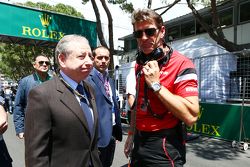Analysis: Why the FIFA corruption scandal could be an opportunity for F1
The ongoing FIFA scandal is offering motorsports' ruling body a golden chance to make Formula 1 lead by example, Kate Walker says

Photo by: XPB Images
















Corruption in sport is a topic that has been the subject of much attention since last-month's arrests of FIFA officials following an investigation into allegations of bribery.
It has also raised some eyebrows in the Formula 1 paddock as it is clear that all sport's governing bodies are now going to be under the spotlight.
The subject of corruption has indeed been gaining momentum for a while now and, at the end of last year, non-governmental organisation Transparency International announced that it would be publishing a series of articles devoted to transparency, governance, and corruption in sport.
This was prompted following FIFA's awarding of World Cups to Qatar and Russia, and IOC president Thomas Bach's revolutionary reform agenda.
Transparency International was involved in the IOC working group on governance in sports organisations, and are broadly supportive of Bach's reform agenda, but others involved in sports governance have been less supportive.
At the 2015 SportAccord convention that body's president, Martin Vizer, used his opening speech to deliver some pretty outspoken remarks.
One observer said: "Vizer essentially accused the IOC of lacking transparency, ignoring the federations, blocking his plans for new multi-sport competitions and wasting money on an Olympic TV channel and opening and closing ceremonies. He described the IOC system as 'expired, outdated, wrong, unfair and not at all transparent.'"
Governments have been joining in on the call to clean up corruption too. British prime minister David Cameron used last week's G7 summit in Germany to say that the FIFA bribery scandal should be the impetus for a concentrated effort to seek out instances of corruption in business, government, and organisations around the globe.
Todt downplays links
Over the weekend FIA president Jean Todt dismissed the possibility that FIFA's corruption scandal would be repeated in motorsport.
He told reporters at the Moscow Formula ePrix that: "There is no way that the FIA could have the same problems with corruption that Fifa are experiencing."
Yet as an organisation, the FIA has areas for development, and would benefit from taking the bull by the horns and seeking to be the international sporting body setting the standards for transparency and governance.
While the FIA received the maximum possible score in just under a fifth of the 63 categories assessed by I Trust Sport during the 2013 presidential elections (the study was commissioned by candidate David Ward), there was also room for improvement.
More transparency
The report recommended increased financial transparency: the publication of salaries and the publication of accounts in line with recognised international standards.
For the FIA to take the initiative and start publishing this information now would demonstrate a federation keen to close the door on potential accusations of corrupt practices within its own body, present and future.
In a time where sports governance is headline news, there is much to be gained from demonstrating a willingness to improve one's own existing standards - or even set new ones for the world to follow.
In some ways, it already does - the I Trust Sport report pointed to the FIA's International Tribunal and International Court of Appeal as being "more comprehensive for dealing with disciplinary matters than comparable systems in most other sports."
The FIA's "extensive investment in non-profit objectives regarding motorsport training and road safety" was also picked out as an example to follow.
The Federation makes much of its membership of full recognition status with the IOC, but the FIFA scandal is the perfect opportunity for organisations with foresight to become standard-bearers in good governance.
The IOC's current reforms include changes to the bidding process, but focus on improving governance and transparency:
Uniquely placed among those organisations with full IOC recognition, the FIA represents everyone, from the motorist, to the pedestrian, to the sports fan.
As a non-profit body investing in safety research, and actively campaigning for improved safety standards for all road users, the FIA has practical and political influence far beyond the realm of sport.
The global reach of its member clubs makes the Federation truly international, and gives it the capacity to lead by example if it is bold enough to set - and spread - new standards of transparency and good governance.
A golden opportunity
Politically, it would be advantageous for the FIA to position itself as one of the most influential bodies in global sport.
First, however, the federation should ensure that its own standards are unimpeachable, particularly with regard to the lack of financial reporting and use of international accounting standards mentioned above.
The assessment and improvement of the FIA's existing practices is an opportunity to become a shining example of transparency and governance in sport.
By working with the IOC in the period of reform, the federation can strengthen its relationships with some of the biggest players in global sport while positioning itself as the bridge between international sport and international activism.
In that way, F1 can lead by example.
Be part of Motorsport community
Join the conversationShare Or Save This Story
Subscribe and access Motorsport.com with your ad-blocker.
From Formula 1 to MotoGP we report straight from the paddock because we love our sport, just like you. In order to keep delivering our expert journalism, our website uses advertising. Still, we want to give you the opportunity to enjoy an ad-free and tracker-free website and to continue using your adblocker.















Top Comments